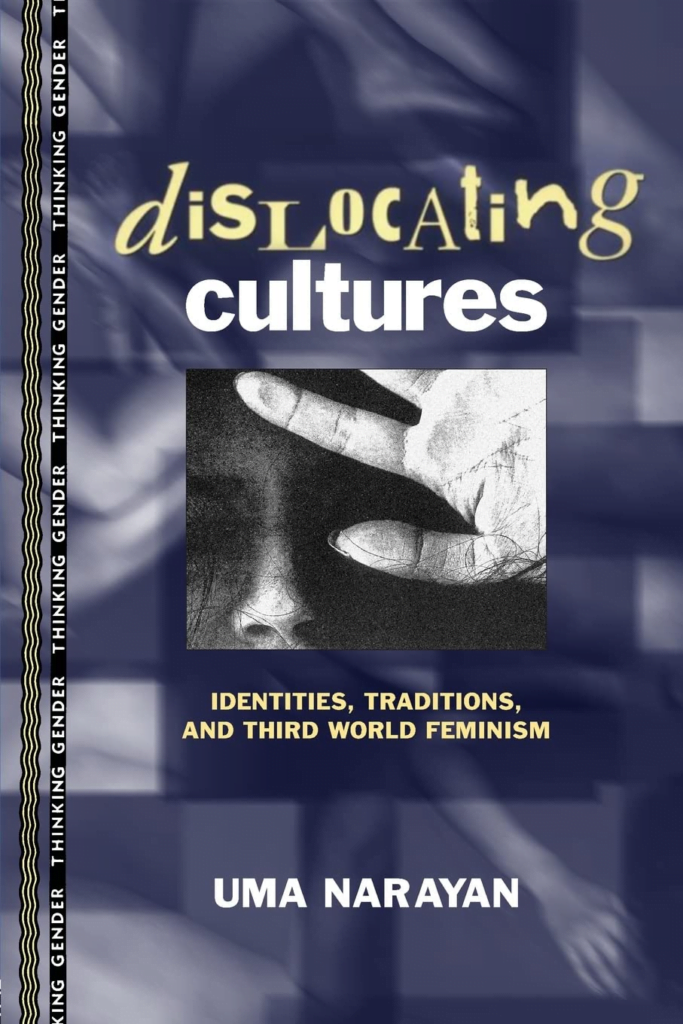Uma Narayan was born on 16th April 1985. She is an Indian feminist scholar who works as a professor of philosophy at Vassar College. Uma Narayan’s work focuses on the epistemology of feminism, delving into concepts like identities, sisterhood, colonialism, and the like.
Her work ‘Dislocating Cultures: Identities, Traditions, and Third-World Feminism’, finds an intersection between nation, identity, and tradition to analyse how the western world has a false notion of Third-World cultures and the feminist agenda.
Uma Narayan’s main aim was to introduce a feminist voice in academia. After receiving her Ph.D. from Rutgers University, she entered the field of Indian legal studies and contributed with her research and writing. During the length of her career, she has also written several primers on Indian legal literature.

Dislocating Cultures: Identities, Traditions, and Third-World Feminism
Uma Narayan’s most notable work is Dislocating Cultures: Identities, Traditions, and Third-World Feminism. Western models claim that feminism originated in India based on their models, and Uma Narayan challenges this assumption through her papers. Dislocating Cultures aims to prove wrong the misinterpretations about third-world cultures.
“Sound and fury of these “my culture are better than your culture” conflicts between male-dominated colonial governments and male-dominated third-world nationalist movements often served to obscure the fact that women were second-class citizens in all these cultural contexts,” writes Uma Narayan
Since colonial times, various political forces have perpetuated these misinterpretations, and Uma Narayan investigates the underlying problems and explains the cross-cultural differences that are often neglected in such discourse. Her work offers a philosophical perspective on issues like nationalism, postcolonial studies, and the “westernisation” debate in other countries.
Uma Narayan has criticised the notion of “westernisation” in third-world cultures and how the concerns of feminists differ from country to country. She emphasises decolonising feminism and vocalising the importance of global feminism.
Also read: Transnational Feminism: An Intersectional, Collaborative, Reflexive Approach To Feminism

She argues that feminist perspectives are not strange or alien to third-world national contexts, and these feminists have practiced their feminist politics even before the concept of westernisation originated. Feminist movements develop worldwide based on the political circumstances that shape women’s social and personal lives.
These movements also rise when the ideations severely impact the developments of social change, thereby hindering the growth and presence of women.
Uma Narayan’s work states that people who deny their identity as a feminist (assuming that they have stemmed from the rise of “westernisation” ) fail to acknowledge the challenges faced by feminists and their work within third-world contexts. Moreover, they disregard the factor that their ideologies were shaped due to the political mobilisation sustained by the women in these third-world countries.
Further, she explains that the cultural conflicts between the colonising and colonised indigenous cultures surround the issues of sexism, gender inequality, the roles of women, and female sexuality.
“Sound and fury of these “my culture are better than your culture” conflicts between male-dominated colonial governments and male-dominated third-world nationalist movements often served to obscure the fact that women were second-class citizens in all these cultural contexts,” writes Uma Narayan.
Exploration of cultural concepts
Uma Narayan’s works highlight the concept of culture itself and the lack of attention it receives when discussing topics that revolve around feminism and politics. Dislocating Cultures is a fascinating study that explores the current issues of international feminism and cultural discourses.
Uma Narayan’s work is a loud stance on the importance of diversity and heterogeneity. She encourages feminists to acknowledge and perceive cultural differences instead of totalising them into a common feminist agenda. Her work on dislocating culture combines her personal experiences as a feminist and scholar, thereby appealing to a larger audience
The theme in all five parts of the book revolves around the identity of feminism concerning the postcolonial images of India. Discussions of cultural activities like Sati, which is the practice of widow-burning, provide an insight into colonialism and how it could have become a vital aspect of Indian culture. Her work also investigates the violence encountered by women in the U.S.A.
Dislocating Cultures demonstrates that Hindu fundamentalists and western feminists have similar notions of culture – they believe culture is a homogeneous and static configuration. Uma Narayan disproves the idea that her feminist stance did not originate due to her foreign education (as many Hindu nationalists believe). Instead, she developed these values as acts of opposition after observing her female family lineage and the inequalities they were subjected to. She explains how her feminism has grown from rebellion and the experience of her culture.

Uma Narayan argues that the concepts of cultural identity and indigenous national culture are outcomes of political struggles. “Discourses of authenticity are discourses of power,” notes Polylog. Ideas of cultural identity and practices are selected in the same way that westernising practices are.
Uma Narayan’s work is a loud stance on the importance of diversity and heterogeneity. She encourages feminists to acknowledge and perceive cultural differences instead of totalising them into a common feminist agenda. Her work on dislocating culture combines her personal experiences as a feminist and scholar, thereby appealing to a larger audience.
Uma Narayan attempts to strip stereotypical perceptions about third-world feminism. She writes, “Shared and collaborative political understanding […:] between Western and Third-World nations and communities […:] requires, of course, willingness on the part of Western feminists to struggle for ‘horizontal comradeship’ and to let the ‘Oppressed Third World Woman as Object of Rescue’ yield to the Third World feminist as an intellectual collaborator and political ally on a wide range of issues that mark our common and fractured world”.
Dislocating Cultures is a vital read to understand one’s privilege as a first-world feminist and to re-learn the construction of feminism in third-world countries. It illuminates the effects of colonialism and imperialism on feminists and encourages people to understand the themes of global feminism. Rather than thinking that there are two types of feminists – one the saviour and the other who needs saving – it is essential for third-world and first-world feminists to work together as allies.
Featured Image Source: The Skinny
About the author(s)
Prathyusha [they/them] is a queer writer from Chennai. When they are not reading, they are either baking or buying books




